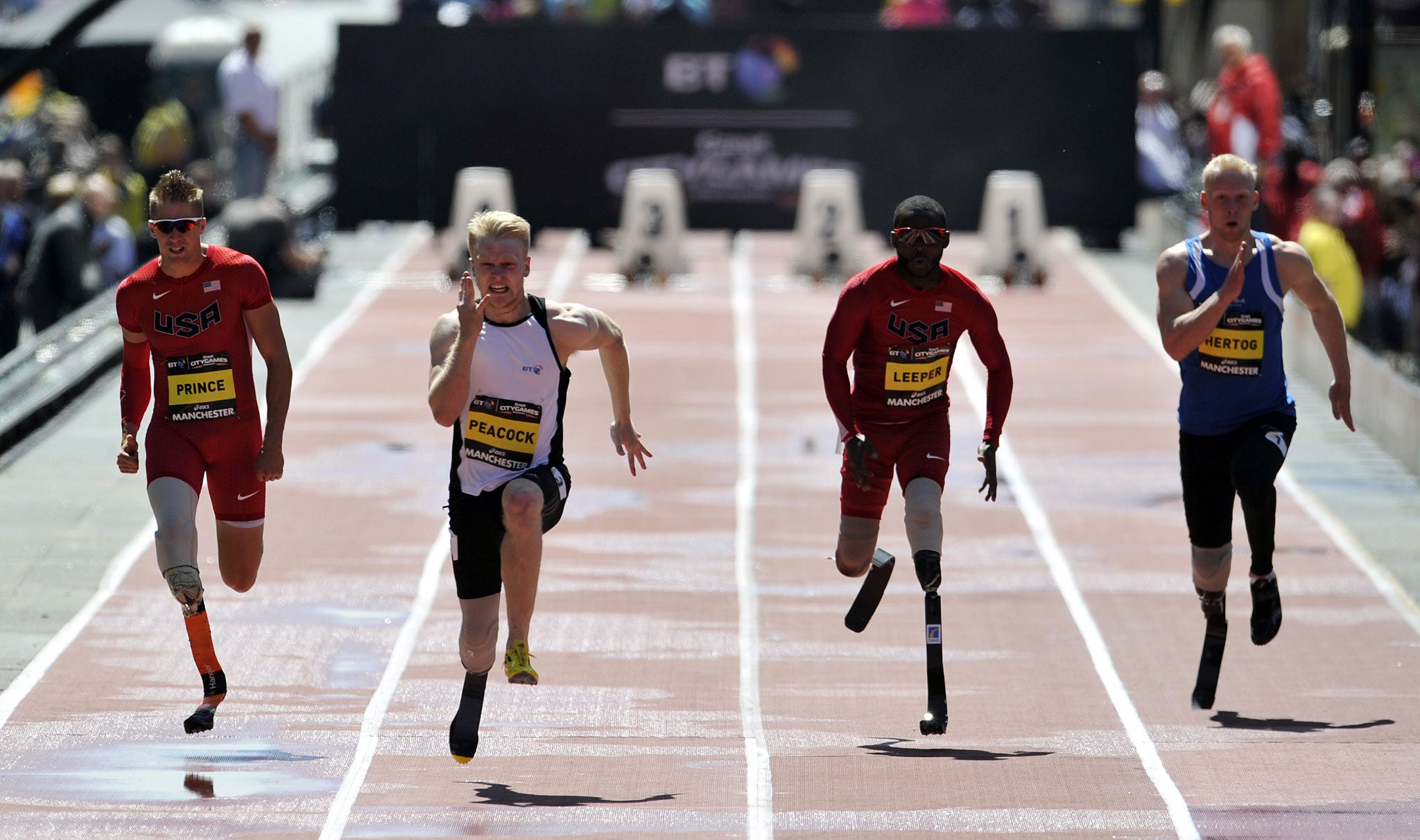Jonnie Peacock suits being a street racer
Paralympian makes winning return after London by sprinting down Deansgate at the Great CityGames

It was, as Jonnie Peacock reflected, the strangest feeling to be sprinting towards a set of traffic lights, even if they were fixed permanently to green.
Peacock's first race since the London Paralympics, where he won gold at the 100m, was along Deansgate, Manchester's equivalent of Oxford Street or Fifth Avenue. He was travelling faster than the average car would manage on any given Saturday afternoon.
The BT Great CityGames are part serious athletics, part entertainment, staged in a city centre in front of an audience that simply turns up to watch. This was the sport dipping its toe back into the water nine months after bathing in the adulation of the London Olympics.
Many athletes, like the treble Olympic medallist, USA's Allyson Felix, who was victorious in the 150m here yesterday, remarked how different, how fun it was to be sprinting through Manchester's main street but Peacock confessed to nerves.
"London was astonishing for the Paralympics and it is on days like these that we need to keep pushing it forward and keep it in the public eye," he said in the wake of what seemed a straightforward victory in the T43/44 100m in 11.46sec. "I wasn't as fast as I hoped. I got to 60m and then crumbled. It was odd to be running towards the traffic lights but, when you are running a 100m, you don't have time to think about what it might mean."
One of the advantages of street racing is that you can measure an athlete's progress. Peacock had the race won by the time he passed Wagamama and was clear by the Royal Bank of Scotland. There were anomalies such as seeing athletes warm up in an office car park mainly used for fag breaks.
Four years ago when Usain Bolt charged down Deansgate to break the world 150m record, it was through familiar Lancashire rain. This time, the sun shone and the genius of the concept was shown when shoppers, on their way to the Arndale Centre, could stop and watch the Olympic long-jump champion take off in front of Manchester's Town Hall.
Greg Rutherford was wearing red to celebrate his support for Manchester United, although since he is from Milton Keynes, City fans would have harrumphed that his allegiance was not surprising. Since Queen Victoria had refused to open the Town Hall in 1877 on the grounds that Manchester was irredeemably socialist, red was appropriate in other ways, too.
There were other reasons for the choice of outfit. Rutherford, the man who became Olympic long jump champion in astonishing circumstances, is without a kit deal, having been dropped by Nike.
"I am taking a gamble and bringing out my own range of kit to try to make up for that loss," the 26-year-old Rutherford said. "It is something that often happens. I am not contracted to anybody at the moment. I don't have a single endorsement."
What makes the CityGames memorable is what marks out the Monaco Grand Prix, the fact that it is recognisably staged in the city where it is set – the views of the Hermitage Hotel, the Casino and the deep blue of the yacht harbour, rather than an endless, anonymous circuit.
"I think this is how athletics should develop," Rutherford said. "On television or in a stadium, there is a distance between the audience and the athlete. Here they can get up close and come and go as they please."
The only downside was that the turnaround was quicker than it would be in a stadium, which may have contributed to a winning jump of 7.99m that left Rutherford slightly flat. "By the end, I was drawing on everything I had."
When Rutherford returns to the Olympic Stadium for the Anniversary Games in July he will have to draw upon more than just reserves of energy.
"It will be emotionally more than physically draining," he said. "In that stadium and on that night, August 4, my life changed. To come back there and perform again as the Olympic champion is a fantastic opportunity. I can remember the rush of adrenalin when I waked out for the Olympics. It will be the same again."
Subscribe to Independent Premium to bookmark this article
Want to bookmark your favourite articles and stories to read or reference later? Start your Independent Premium subscription today.

Join our commenting forum
Join thought-provoking conversations, follow other Independent readers and see their replies